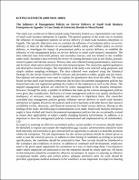| dc.description.abstract | KIYINGI KENNETH (2009-M101-10003)
The Influence of Management Policies on Service Delivery of Small Scale Business Enterprises in Uganda: A Case Study of University Hostels in Nkozi Parish
The study was carried out in Nkozi parish using University hostels as a representative case study of small scale business enterprises in Uganda. The general purpose of the study was to examine the influence of management policies on service delivery of small scale business enterprises in Uganda. The specific objectives were to; examine the influence of recruitment policy on service delivery, to find out the influence of occupational health, safety and welfare policy on service delivery, to investigate the impact of procurement policy on service delivery, to establish the influence of risk management policy on service delivery in small scale business enterprises. The data collected were from both primary and secondary sources, and was limited to the variables under study. Secondary data involved the review of existing literature such as text books, journals, research papers and internet sources. Primary data were obtained using questionnaires, interviews and by direct observation method from the selected participants. The researcher applied qualitative and descriptive research designs. The respondents in the study were selected using purposive and simple random sampling techniques. The data collected were analysed using the Statistical Package for the Social Sciences (SPSS) software and presented in tables, graphs and pie-charts. Descriptions and narrations were used to explain the quantitative data from the tables. The study found out that small scale business enterprises did not have documented management policies but instead had rules and regulations guiding the conduct of the employees as well as the clients. The implied management policies are enforced by senior management in the business enterprises. However, through the study, a number of attributes that make up the various management policies were given due consideration. Deficiency of some management policies was mainly attributed to inadequacy of necessary tools, equipment and resources to implement them. The researcher concluded that management policies greatly influence service delivery in small scale business enterprises in Uganda. However, the policies need to be in harmony with other factors like resource availability (water, electricity, and financial resources) for better service delivery. Basing on the findings of the study, the following recommendations were made; Small scale business enterprises ought to have drafted and clearly documented management policies that are occasionally revised to ensure their applicability in today's rapidly changing business environment. In addition, it is important to have the management policies communicated and implemented by all stakeholders. 120
In respect to ensuring an effective recruitment policy, actual number of vacancies should clearly be identified to expose and counter the employment gap, vacancy advertisements should be done both internally and externally to give internal staff an opportunity to advance to desirable positions within the enterprises. The job requirements for the various positions should be clearly given in order to ease the selection process. In addition to short listing of candidates according to personal specifications, the candidates should be contacted in time. New recruits should be introduced to the workplace and conditions of service. In addition to continued staff development, employees need to be given equal opportunity for promotion as a way of motivating them. Circumstances under which employees are dismissed or exit the enterprise should be clearly spelt out. All forms of discrimination should be avoided for effective recruitment. In respect to ensuring an effective occupational health, safety and welfare policy; adequate protective attire for work should be provided, appropriate medical assistance to the workforce is also important. In respect to ensuring
an effective procurement policy, necessary tools and materials for work should be sufficient, and accessible. The level of bureaucracy in accessing the needed resources should be minimised. In respect to ensuring an effective risk management policy, potential risk should be appropriately managed by installing fire extinguishers and fire hydrants against fire outbreaks. All enterprises ought to have active insurance policies to safeguard the business property. Additionally, the work environment should be suitable to minimise potential risk and also enhance better service delivery in the small scale business enterprises.
Key Words: Influence, Management, Policies, Service Delivery, Small Scale, Business Enterprises University Hostels, Nkozi Parish. | en_US |


